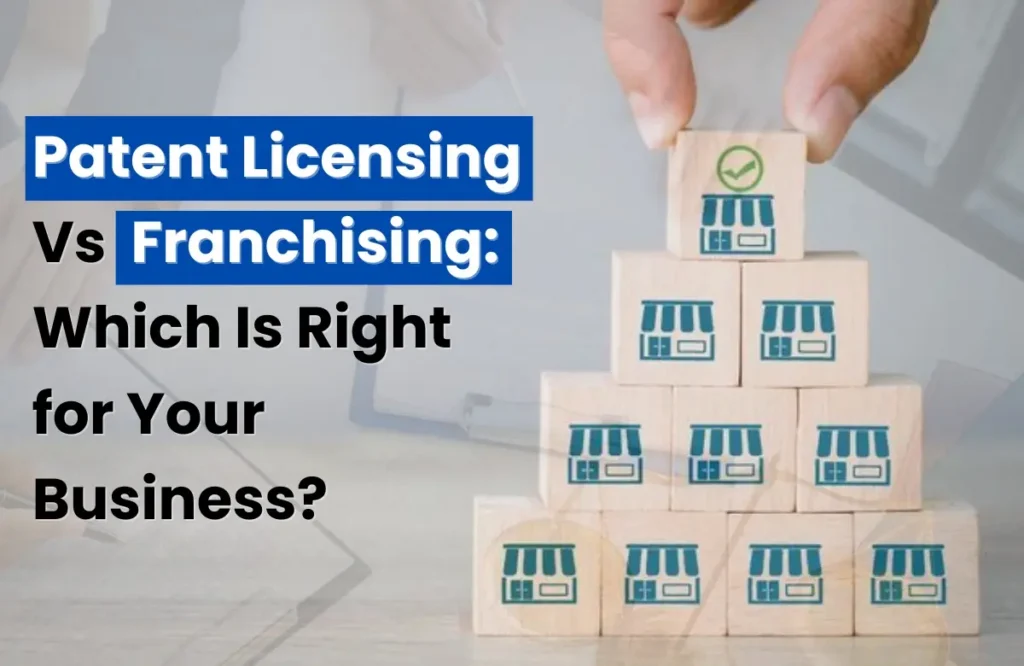
When it comes to doing business in a country like India, one of the biggest concerns for entrepreneurs is how to expand and grow their business in the future. Among the many ways to scale up, two important terms often come into discussion: patent licensing vs franchising. At first glance, these two concepts may appear similar because both involve granting rights to another party. However, in reality, patent licensing vs franchising are quite different, especially in how they operate and impact a business’s growth strategy. Understanding this difference is crucial for anyone looking to expand smartly and sustainably. If you want to learn how each model work, keep reading.
What Does Patent Licensing Mean for Inventors and Companies?
To understand the concept in depth, let’s start with patent licensing. As the term “licensing” suggests, this is one of the key forms of patent monetization in India. In simple terms, patent licensing allows the patent holder to give permission to another party to use the patented invention under certain agreed conditions. However, this arrangement does not transfer ownership of the patent — the original patent holder remains the legal owner. Through this process, the patent holder can earn revenue or royalty income from the patent while still retaining full ownership rights. This makes patent licensing a practical way for innovators and businesses to profit from their inventions without losing control over them.
Read Also: Patent Licensing Advantages And Disadvantages That Every Entrepreneur Should Know
When it comes to the types of patent licensing, there are mainly three types ot it, such as:
- Exclusive
- Non-exclusive
- Sole license
Patent licensing is commonly used when inventors or companies want to monetize their patents without having to manufacture or sell the products themselves. It allows the patent owner to earn royalties while expanding the reach of their technology through others.
What Does Patent Franchising Mean, and How Does It Work?
Patent franchising is a business model that combines the use of patented technology with a franchise system. In this arrangement, a company that owns a patented invention give another party the right to use the patent to operate under its system. This setup allows businesses to expand faster while maintaining control over their brand and technology.
Unlike patent licensing, which only gives permission to use a patented invention, patent franchising involves much more — it includes access to the entire business framework such as operating methods, training, supply chains, marketing, and quality standards. The patent, in this case, becomes a core part of the franchise’s identity or offering.
The working of a patent franchise generally includes:
- The franchisor gives the franchisee legal permission to use its patented technology within the business model.
- The franchisor provides detailed training, operational manuals, and technical assistance to ensure quality and consistency.
- The franchisee usually pays an upfront fee and regular royalties based on revenue or sales.
- The franchisor monitors how the patented product or process is used to maintain brand standards.
- The agreement defines how long the franchise relationship lasts and under what terms it can be renewed or terminated.
Patent franchising is useful in technology-driven industries, manufacturing, food and beverages, and healthcare, where innovation and standardization both play key roles. It enables businesses to expand rapidly, allows entrepreneurs to operate under a proven model, and ensures that the patented innovation remains protected and profitable. Both are the best options in Patent Licensing vs Franchising.
Read Also: What to Do After Monetizing Your Patent And How to Make Money from Your Patents
Conclusion
In the debate of Patent Licensing vs Franchising, Patent franchising offers a powerful way for businesses to grow by combining innovation and entrepreneurship. It allows patent owners to expand their reach while maintaining control over their technology and brand, and gives franchisees the chance to operate a proven business model backed by unique patented products or processes. Unlike simple patent licensing, franchising provides a complete system from training to marketing support ensuring consistency and quality across every outlet.




